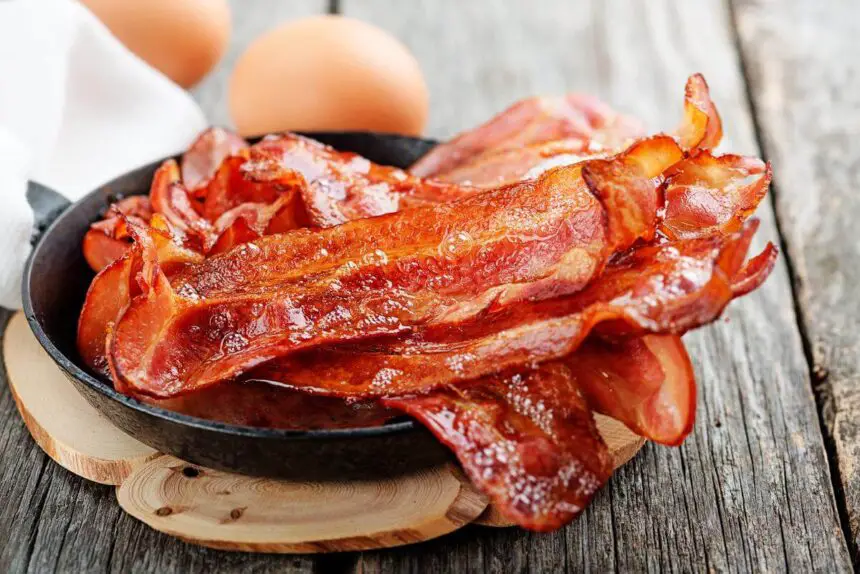Cats are known to be carnivores, and their dietary requirements vary significantly from those of humans. As a result, many cat owners wonder what types of human food their feline friends can consume. One common human food that often comes to mind is bacon. Bacon is a popular food item that is enjoyed by many, and it is often used as a treat or a topping for various dishes. In this article, we will explore whether cats can eat bacon and whether it is safe for them to do so.
Can cats eat bacon?
Yes, cats can eat bacon, but it is not recommended as a regular part of their diet. Bacon is high in fat, salt, and preservatives, which can be harmful to cats in large quantities. Additionally, bacon is a processed meat, which means that it contains nitrates and other chemicals that may be harmful to cats.
While it is not recommended to feed cats bacon, a small amount of cooked, unseasoned bacon can be given as an occasional treat. However, it is important to ensure that the bacon is cooked thoroughly and that it is not too fatty. Giving cats too much bacon or feeding them bacon that is too fatty can lead to obesity, pancreatitis, and other health problems.
The dangers of feeding cats bacon
Feeding cats bacon on a regular basis can have negative effects on their health. Some of the dangers of feeding cats bacon include:
Obesity
Bacon is high in fat and calories, which can lead to weight gain and obesity in cats. Obesity can lead to a variety of health problems, including diabetes, heart disease, and joint problems.
Pancreatitis
Eating fatty foods like bacon can cause inflammation of the pancreas in cats, a condition known as pancreatitis. Symptoms of pancreatitis in cats include vomiting, diarrhea, and abdominal pain.
Salt toxicity
Bacon is high in salt, which can be toxic to cats in large quantities. Salt toxicity can lead to dehydration, vomiting, diarrhea, and even death.
Gastrointestinal problems
Cats have sensitive digestive systems, and feeding them bacon can cause gastrointestinal problems like diarrhea, vomiting, and stomach upset.
Allergic reactions
Some cats may be allergic to bacon, which can cause symptoms like itching, swelling, and difficulty breathing.
Alternatives to feeding cats bacon
While bacon is not recommended as a regular part of a cat’s diet, there are some healthier alternatives that cat owners can consider. Some of the alternatives to feeding cats bacon include:
Cooked chicken or turkey
Cooked chicken or turkey is a great source of protein for cats, and it is much healthier than bacon. Make sure to remove the skin and any bones before feeding it to your cat.
Canned cat food
Canned cat food is a great option for cats, as it contains all the nutrients that they need. Look for high-quality cat food that is free from fillers and artificial preservatives.
Raw meat
Some cat owners choose to feed their cats a raw diet, which can include raw meat like chicken, turkey, or beef. It is important to consult with a veterinarian before feeding your cat a raw diet, as it can be dangerous if not done correctly.
Cat treats
There are many cat treats available on the market that are specially formulated for cats. These treats are a great way to give your cat a tasty snack without the risks associated with human food.
Conclusion
In conclusion, while cats can eat bacon, it is not recommended as a regular part of their diet. Bacon is high in fat, salt, and preservatives, which can be harmful to cats in large quantities. Additionally, bacon is a processed meat, which means that it contains nitrates and other chemicals that may be harmful to cats. If you do choose to give your cat bacon, it should be in small amounts and should be cooked thoroughly without any added seasoning. It is also important to monitor your cat for any signs of negative reactions or health issues after feeding them bacon.
As a responsible cat owner, it is important to provide your feline friend with a well-balanced and nutritionally complete diet that meets their specific dietary requirements. This includes high-quality cat food that is formulated to meet their nutritional needs, as well as occasional treats that are safe and healthy for them to consume.
If you have any concerns about your cat’s diet or health, it is important to consult with a veterinarian. A veterinarian can provide you with guidance and recommendations on the best diet for your cat based on their age, breed, weight, and health status.


